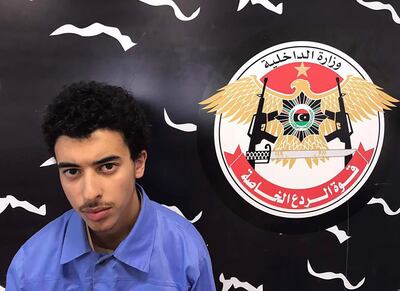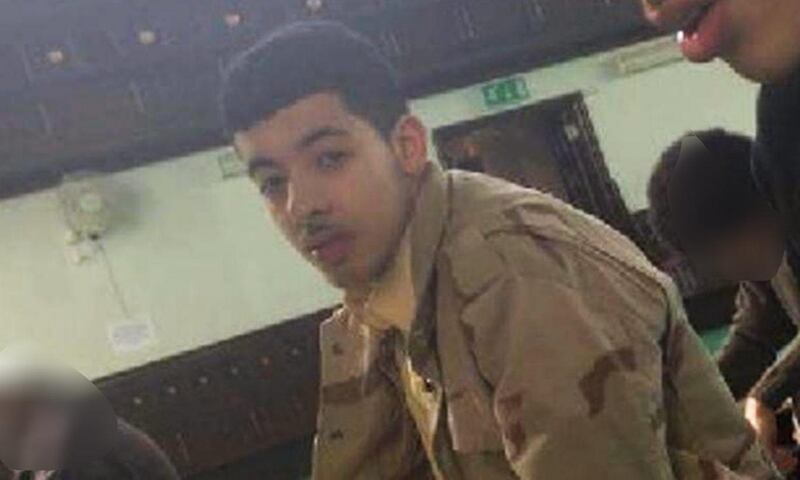When news broke of the death of Muammar Qaddafi, celebratory Libyans spilled into the streets firing rockets and banging drums. “It’s a very big victory for the Libyan people,” said one jubilant man as a number 42 bus rolled slowly past behind him. For this was not Tripoli, but Manchester in the northwest of England, home to the country’s largest Libyan community in the UK.
The crowd would have been bigger were it not for the many who made the 1,500 mile-journey in 2011 to fight for the overthrow of Qaddafi. Among them were Salman Abedi, who back in his birthplace six years later would detonate a rucksack bomb that sprayed metal shards across the foyer of a concert venue killing himself and 22 others.
Another of the travellers was the imam of the Didsbury Mosque, the focal point of the Libyan community, where Salman, his father Ramadan and other members of his family went to pray.
Mustafa Graf - who was jailed by Qaddafi loyalists during the trip to see his parents - recalled this week how he and his fellow inmates celebrated inside their squalid prison cells when they heard Nato jets pounding Qaddafi troop positions.
"It was like a painkiller for us," the imam told the National. "We knew at that time they would never stop until they got rid of Qaddafi. Britain was a Nato founder member and in return he [Abedi] did that. It's very, very sad."
Six months on from the attacks, the British-Libyan community is still grappling with the question of how a killer born and raised in this apparently cohesive city of migrants could have been so filled with hate to carry out such an attack.
The murders of 22 people – more than a third of them girls aged from eight to 17 – has shone a light on extremist elements within the community and the government's response handling of dissidents who sought sanctuary in the UK.
Britain's intelligence agencies were well aware of the Islamist nature of a contingent and aided their travel back to Libya to overthrow Qaddafi, but questions have been raised about its failure to heed the threat that a generation of British-born radicals could pose to the UK.
Britain has historically supported fighters seeking the overthrow of hostile regimes in Afghanistan, Libya and Syria while then seeking to mitigate the threat from the ‘blowback’ when the now battle-hardened veterans returned to Britain, said Nasir Afzal, a prominent lawyer who is on a panel investigating what went wrong in Manchester.
“They’re going to be mistakes and they’re going to be people that you miss,” he said. “Abedi would appear to be one of those people who was radicalised because of what was happening in Libya … but was not spotted or worked with.”
________________
Read more
[ ‘Pure evil’ Manchester attack will not deter people, say Britons in the UAE ]
[ Tech giants must do more to report terrorists to police, UK counterterror officer warns ]
________________
Police believe that Abedi was not part of a network but are investigating the wider links between the 22-year-old and more than a dozen young men who lived within a few miles of his home who have been jailed, killed or exiled because of their allegiance to ISIL. They include Abdalraouf Abdallah, 24, a dual British-Libyan national, who was shot and wounded in August 2011 in Libya while fighting the Qaddafi regime.
Living in Manchester but paralysed from the waist down, he was “wholly committed” to terrorism and co-ordinated the travel of four other Manchester-based Britons to join ISIL fighters in Syria, according to court documents.
He was jailed for five-and-a-half years in 2016 and twice received prison visits from Abedi earlier this year, according to the Manchester Evening News. What they discussed is part of the police investigation.
Facing persecution in Libya, Abedi’s family was one of many that travelled to Britain in the 1990s and settled in south Manchester.
Though born in Britain, Abedi’s life was interwoven with the politics of the Libyan dissident movement. Cosmopolitan but cheaper than London, Manchester attracted exiles from Libya including the Islamists persecuted by Qaddafi.

Abedi’s father was a senior member of the Libyan Islamic Fighting Group (LIFG), an Al Qaeda-linked group. Its leadership abandoned Libya in the mid-1990s and continued its activities in exile in the UK and notably in Manchester.
Reda Fhelboom arrived in Manchester in 2001 to study and discovered a hardline element within the community whose views were not challenged. He said he was not surprised by the attack on Manchester Arena on May 22.
"These extremists stayed for a long time fighting with Al Qaeda in Afghanistan. They went to the UK with the same ideology and they never changed it," Fhelboom, a journalist and university lecturer now back in Libya told The National.
“In Manchester, they were given the freedom to practice what they said and thought. Those extremists exploited this freedom to launch such attacks. European countries are paying the price.”
Mustafa Graf, an imam at Didsbury mosque in south Manchester since 1995, said that he challenged “strict” views but elements of the community were careful what they said to him.
“They always respected me, but they left me in the corner,” he said. “I was not one of the people to talk about everything with. I kept my distance from some things in the Libyan community.”
_________________
Read more
[ Manchester bombing shows the odds stacked against Britain’s security services ]
[ Manchester Muslims fear backlash after terror attack ]
_________________
British government officials are increasingly hopeful that the authorities will agree to its request to extradite Salman Abedi's younger brother, Hashem. He is currently held in a Tripoli jail and likely to be the only person to face trial after the police said there was no evidence of a broader network behind the attacks.
The Mayor of Manchester, Andy Burnham, has appointed a panel to draw up plans for a new anti-radicalisation strategy after criticisms of a national programme and the failure to identify Abedi as a potential killer.
Abedi was reported to the authorities after he spoke out in support of suicide bombers, according to Mohammed Shafiq, of the anti-extremist Ramadhan Foundation. An imam at Didsbury mosque, Mohammed Saeed, has said that Abedi had looked at him “with hate” after a sermon against terrorism.
“Our concerns were enough to report him to the authorities,” said Mr Shafiq. “Clearly there are questions about what they did about it.”
Security officials could have put a higher priority on some of the calls but an internal investigation is set to clear the domestic security agency MI5 and the police of making serious mistakes that could have prevented the attack, according to reports this week.
“When you’ve got potentially 25,000 people who are referred or calls made about … you’re going to miss one or two,” said Mr Afzal.







